How to visit an onsen as a solo female traveler
How to visit an onsen in Japan as a single female traveler- Visiting an onsen, or traditional Japanese hot springs bath, is a rite of passage when in Japan. The culture of soaking in an onsen is quintessentially Japanese, and is a relaxing and restorative experience. Onsens can be located indoors or outdoors, and can be found as part of hotels or ryokans, or can be public or privately maintained.
There is not much better in life than soaking in an outdoor onsen, watching the steam rise up above the water as the snow falls down all around you on a cold winter afternoon.
What is an onsen?
Straight from Wikipedia, An onsen (温泉?) is a Japanese hot spring and the bathing facilities and inns frequently situated around them. As a volcanically active country, Japan has thousands of onsens scattered throughout all of its major islands. Onsens were traditionally used as public bathing places and today play a central role in Japanese tourism. As someone who is big on the idea of baths, I was freakishly excited to visit a country in which bathing was part of the national culture- Japanese hot tubs, or onsets, should be a part of everyone’s visit to the country.
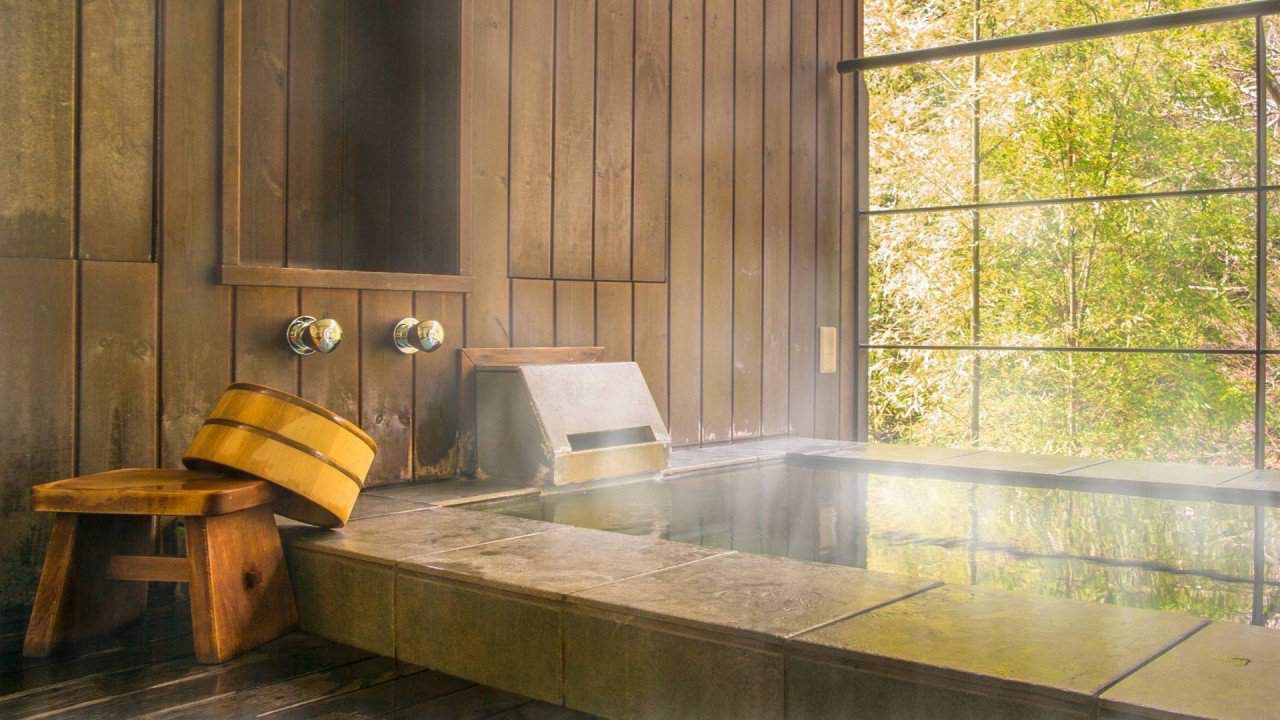
What do I wear? Japanese Onsen Etiquette.
Trick question- nothing! Yes, onsens are visited sans vetements, so leave your clothes hanging on a rack by the side, or in the provided locker rooms. Although it seems normal to be weirded out by the idea of taking a bath naked with a bunch of strangers; don’t let it get you down. This is completely normal, and you’ll encounter folks of all ages and walks of life relaxing and enjoying the warm water, friends catching up for a chat over a soak, or mothers and children together. Be polite and smile, but obviously don’t stare!
Also, try not to feel self-conscious -everyone is in the same boat, so to speak, and no one’s judging your appearance- embrace the differences between the Japanese culture and your own, rather than fear it, and you’ll enjoy yourself much more. If you do attract extra notice or curiosity, it’s probably because you aren’t Japanese, rather than from your six-pack not being as firm as you’d like.
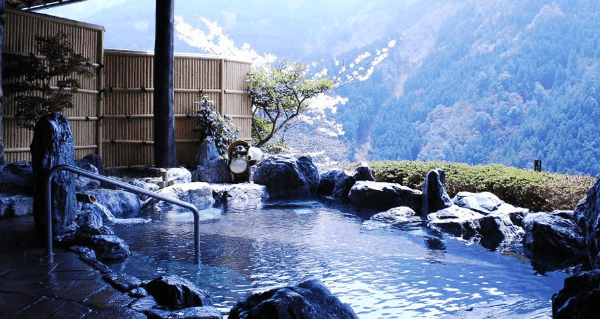
Before entering the onsen, make sure you shower thoroughly. Shower facilities will always be provided near the locker room or storage areas- not a bad idea to bring your own soap.
A word of warning, not all onsens are sign-posted in English.
While visiting one in Hakone, a mountainous spa town near Mount Fuji, I took the town bus to an outdoor onsen, recommended by my ryokan hosts. Hakone is a popular onsen town in Japan, and also popular for its proximity to Mount Fuji. It is easily accessed by train from Tokyo.
Upon arrival, everyone filed off, and then queued up by what looked like a vending machine outside the entrance and in the middle of the parking lot. Not having a clue what was going on, I pretended to rummage through my wallet and let everyone else go ahead of me. When it was my turn, I saw it was some sort of entry fee, paid into a machine. As it was all in Japanese, I was thoroughly befuddled, and by then all of my fellow Japanese bus passengers had made their way inside, leaving me alone in the parking lot.
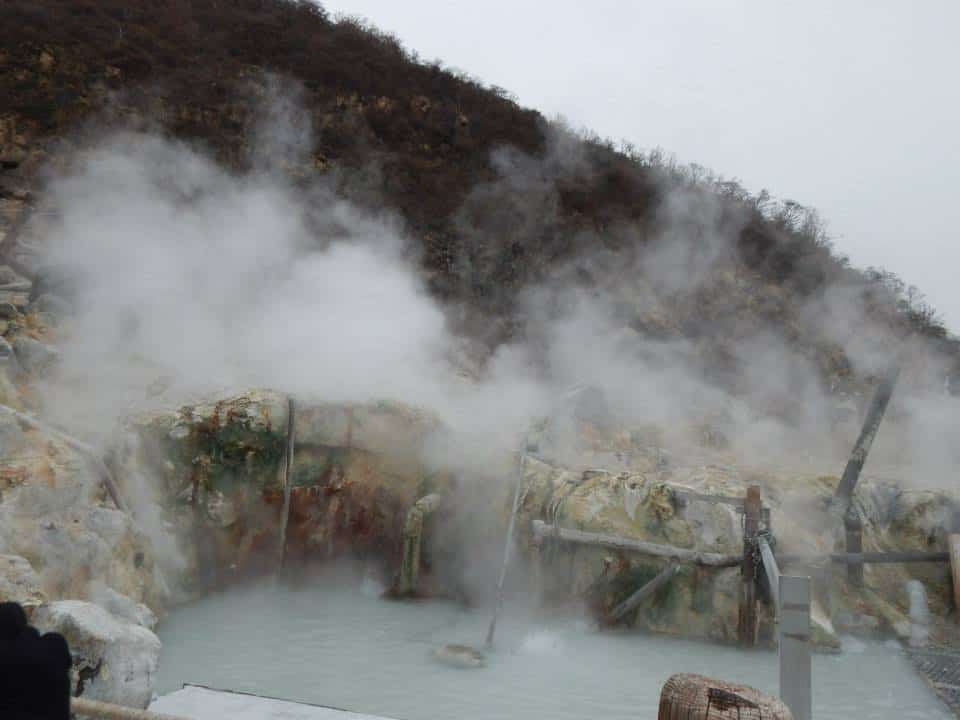
After what seemed like forever, but probably wasn’t, a family made their way over and kindly were able to explain to me the gist of what was going on. Put your yen into the machine, and obtain a ticket for entrance, which was then taken to the front desk, in exchange for access. Why tickets aren’t simply purchased from the front desk, I never figured out. The mission of finding the ladies room, as opposed to the men’s room, was another cringe worthy moment, courtesy of my severe lack of Japanese, but saved thanks to the confused look on my face, and/or pity on behalf of one of the onsen’s staff.
Who do I go with?
Public onsens are segregated by gender, so the onsens I visited only contained other women (although you may see young male children with their mother). However, private onsens can often be found in hotels, or can be accessed through a public onsen for an additional charge, usually paid by the hour. If a family or couple wanted to bathe together, they could then hire a private onsen for their sole use. If you do go with a friend of the opposite gender to a large public onsen, you’ll be bathing in separate areas, so plan a time to meet afterwards.
In hotels, the facility may have several private onsens for guest use. At certain times of the day, one room might be the male onsen, then in the afternoon it may switch to the female onsen. This is so guests are able to experience the full range of a hotel’s offerings. The moral of this story is always double-check the timings in the entryways, to avoid accidentally crashing a party that you might not want to crash. Japanese onsen etiquette is important
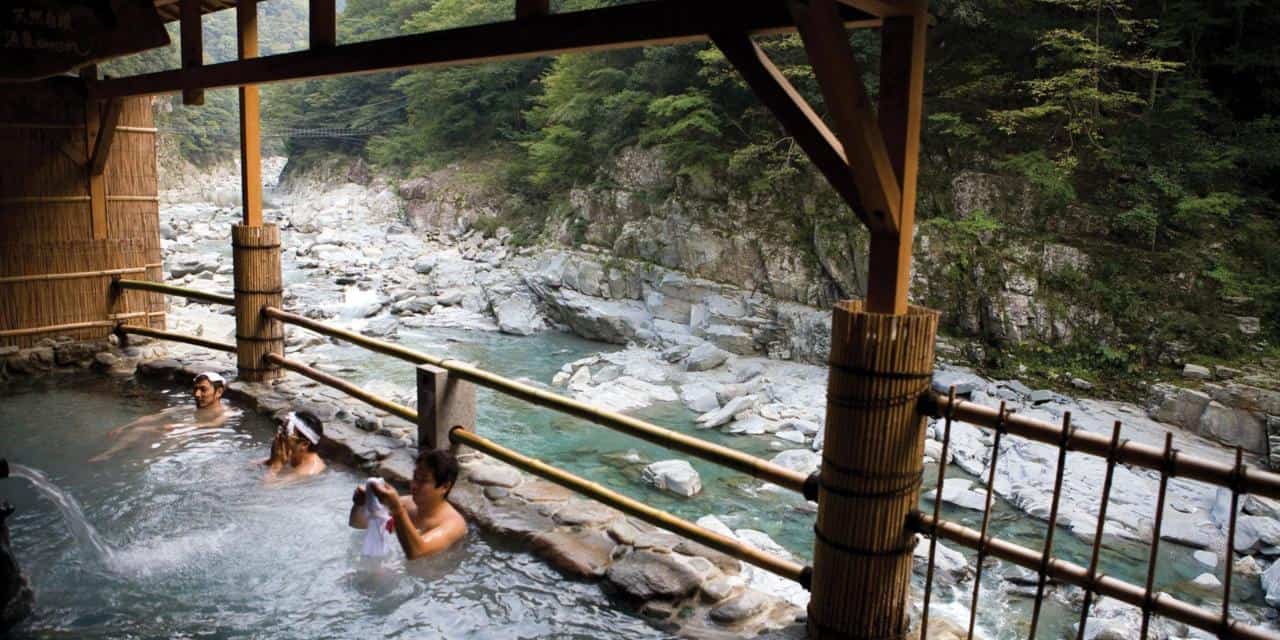
What if I have tattoos?
Historically, onsens have preferred to keep out those who have tattoos, as tattoos signified an individual’s involvement in criminal or gang activity. While this is still the case in some places, most tourists with a few tattoos will have no problems. They are becoming much more popular than in years past, and are no longer associated with criminal activity. As I don’t actually have any tattoos myself, I won’t claim to be an expert on this -more detail on the topic can be found here .
What is the cost?
If you are staying at a hotel or ryokan with an onsen attached, then the usage fees will be included in your accommodation price. If you visit a private onsen, the prices can range from AUD $5-25. When in doubt, ask your hotel concierge or tourist information center for advice on where to go.
When I visited Hakone, I stayed in Fukuzimiro, a stunning heritage ryokan built in 1890. It’s got the be the best onsen ryokan I’ve ever seen- the place was built with zen in mind, and makes for an amazing traditional ryokan experience. There were several onsen on site, however the ryokan was also really close to public transportation, so I could easily walk or take a bus to a wide range of other onsen in the Mount Fuji area.
What’s the deal with those little towels? The onsen towel.
On your first visit, you’ll note most everyone has a small hand-held towel, or Japanese bath towel. These small face towels are certainly not for modesty, as they wouldn’t cover much up, but are used for wiping off sweat. I noticed most people tended to put their towel on their head while bathing. At first thought, this seemed rather odd, but after a minute it made sense to me. You don’t want to set your towel on the ground, as it would get soaked, and leaving it on a chair would make it impossible to know who owned what towel (given they are all the same). That doesn’t leave many other options, other than one’s own head. It’s also not nice to dunk your towel in the water, as it is considered unclean and not polite.
You can purchase a towel from the larger onsens if you don’t have your own, otherwise bring one along with you and save a few yen.
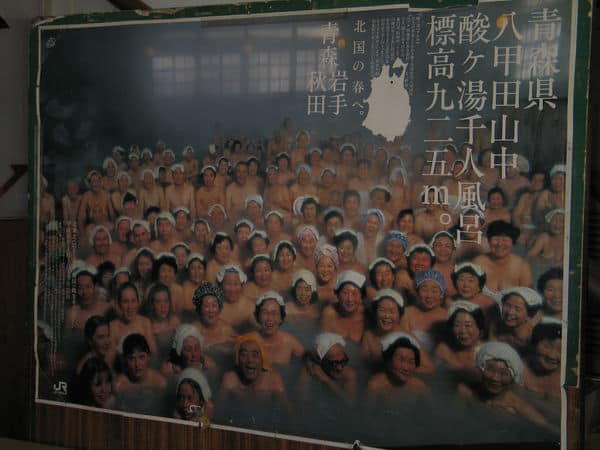
What else do I need to know?
Larger onsen facilities also offer massage, yoga, relaxation rooms, and tea rooms, so you can really make a full day out of it. After a couple of days of lots of walking in the cold, soaking up culture and history, it was nice to just be able to literally soak myself instead.
It’s worth bringing along some coins, in case you need to hire a locker for your belongings.
Also, in addition to the hot springs, some larger facilities will also offer ice baths, so stick your foot in before taking the plunge. The freezing, goosebump-inducing baths are meant to help with circulation, as far as I can gather, but I’ll stick to the cozy-warm types.
If you’re looking for an escape from Tokyo for a few days, I would definitely recommend Hakone- the Hakone hot springs are plentiful, relaxing, and are a perfect place to relax for a weekend.
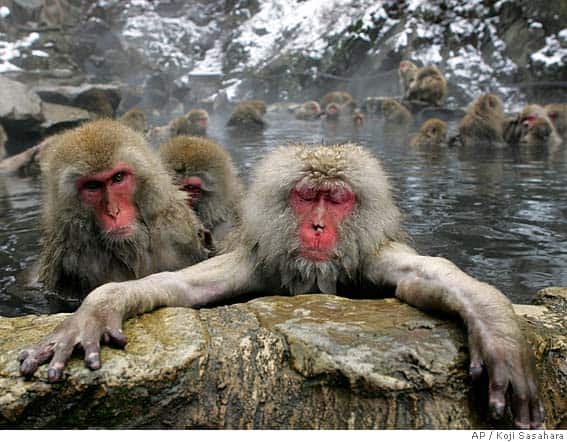
I’ve pulled together links to some of the best onsens in Japan, for a bit of trip inspiration:
Onsens, ryokans, and hotels in the Mount Fuji region
Lonely Planet’s Top Ten Hot Springs in Japan
Travelience Top Ten Recommended Onsen

Great article – lots of information